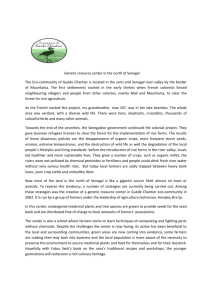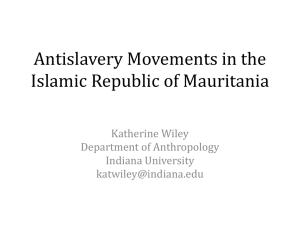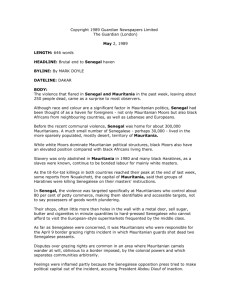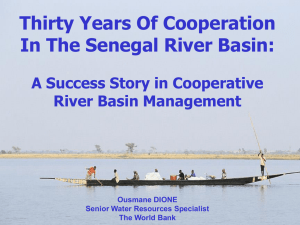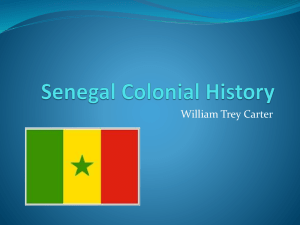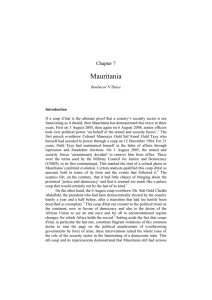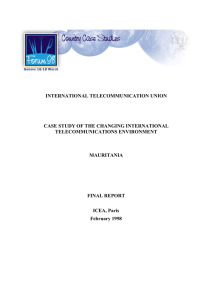I WAS BORN A SLAVE
advertisement
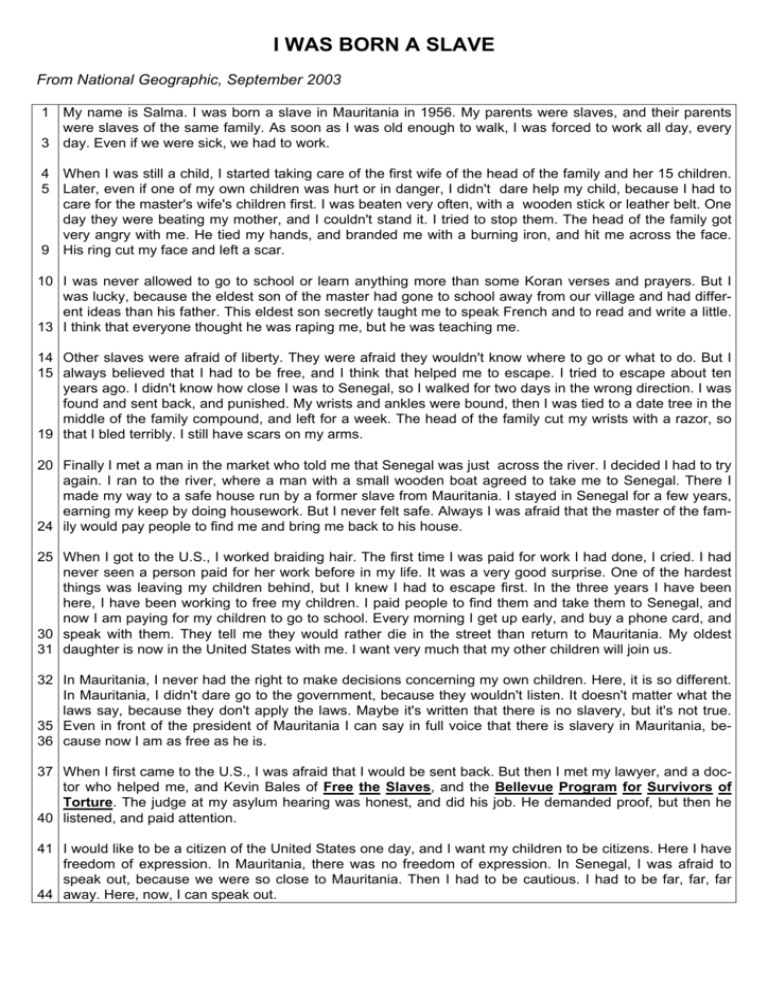
I WAS BORN A SLAVE From National Geographic, September 2003 1 My name is Salma. I was born a slave in Mauritania in 1956. My parents were slaves, and their parents were slaves of the same family. As soon as I was old enough to walk, I was forced to work all day, every 3 day. Even if we were sick, we had to work. 4 When I was still a child, I started taking care of the first wife of the head of the family and her 15 children. 5 Later, even if one of my own children was hurt or in danger, I didn't dare help my child, because I had to care for the master's wife's children first. I was beaten very often, with a wooden stick or leather belt. One day they were beating my mother, and I couldn't stand it. I tried to stop them. The head of the family got very angry with me. He tied my hands, and branded me with a burning iron, and hit me across the face. 9 His ring cut my face and left a scar. 10 I was never allowed to go to school or learn anything more than some Koran verses and prayers. But I was lucky, because the eldest son of the master had gone to school away from our village and had different ideas than his father. This eldest son secretly taught me to speak French and to read and write a little. 13 I think that everyone thought he was raping me, but he was teaching me. 14 Other slaves were afraid of liberty. They were afraid they wouldn't know where to go or what to do. But I 15 always believed that I had to be free, and I think that helped me to escape. I tried to escape about ten years ago. I didn't know how close I was to Senegal, so I walked for two days in the wrong direction. I was found and sent back, and punished. My wrists and ankles were bound, then I was tied to a date tree in the middle of the family compound, and left for a week. The head of the family cut my wrists with a razor, so 19 that I bled terribly. I still have scars on my arms. 20 Finally I met a man in the market who told me that Senegal was just across the river. I decided I had to try again. I ran to the river, where a man with a small wooden boat agreed to take me to Senegal. There I made my way to a safe house run by a former slave from Mauritania. I stayed in Senegal for a few years, earning my keep by doing housework. But I never felt safe. Always I was afraid that the master of the fam24 ily would pay people to find me and bring me back to his house. 25 When I got to the U.S., I worked braiding hair. The first time I was paid for work I had done, I cried. I had never seen a person paid for her work before in my life. It was a very good surprise. One of the hardest things was leaving my children behind, but I knew I had to escape first. In the three years I have been here, I have been working to free my children. I paid people to find them and take them to Senegal, and now I am paying for my children to go to school. Every morning I get up early, and buy a phone card, and 30 speak with them. They tell me they would rather die in the street than return to Mauritania. My oldest 31 daughter is now in the United States with me. I want very much that my other children will join us. 32 In Mauritania, I never had the right to make decisions concerning my own children. Here, it is so different. In Mauritania, I didn't dare go to the government, because they wouldn't listen. It doesn't matter what the laws say, because they don't apply the laws. Maybe it's written that there is no slavery, but it's not true. 35 Even in front of the president of Mauritania I can say in full voice that there is slavery in Mauritania, be36 cause now I am as free as he is. 37 When I first came to the U.S., I was afraid that I would be sent back. But then I met my lawyer, and a doctor who helped me, and Kevin Bales of Free the Slaves, and the Bellevue Program for Survivors of Torture. The judge at my asylum hearing was honest, and did his job. He demanded proof, but then he 40 listened, and paid attention. 41 I would like to be a citizen of the United States one day, and I want my children to be citizens. Here I have freedom of expression. In Mauritania, there was no freedom of expression. In Senegal, I was afraid to speak out, because we were so close to Mauritania. Then I had to be cautious. I had to be far, far, far 44 away. Here, now, I can speak out.

